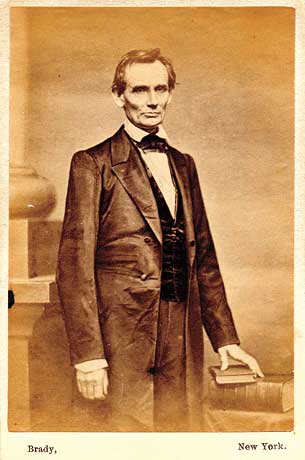
(3 of 4)
His stepmother Sarah Bush Johnston organized the home and encouraged Lincoln to read. Armed with that crucial skill, he would walk to Gentry's store, two miles away, where he occasionally found newspapers. In these, he learned of a miracle under way in a far-off state called New York. At the urging of Governor DeWitt Clinton, a great canal had been dug nearly 15 times as long as any previous American canal, connecting one end of the state to the other. Attacked and derided as government waste, the Erie Canal was carrying more freight within a few years than the entire Mississippi River. Thousands of hardscrabble farmers and isolated craftsmen — people like the Lincolns — were suddenly able to move their produce to distant markets, and the boom at the port of New York created thousands of new jobs. The New York governor also founded a bank where these "penniless beginners" could "save a surplus." Their little savings could be gathered into the capital needed for further economic development — an idea, historian Daniel Walker Howe writes, that "seemed novel at the time" but proved to be a "huge success."
Lincoln had found a key to unlock the prison of poverty. Here was an upward path that did not depend on the favor of aristocrats or the force of arms. This was the vision that propelled him into politics. In Indiana, Lincoln experienced the liberating thrill of earning his first half-dollar, for ferrying a pair of strangers to a newfangled steamboat on the Ohio River. Later, having reached manhood, he helped his father move one more time, then left the farm without regret. He soon found himself in New Salem, Ill., a riverside village bursting with hopes, if only its little waterway could be widened for commercial traffic. With this ultimately fruitless project as his first grand undertaking, Lincoln began to puzzle his way toward the goal of becoming "the DeWitt Clinton of Illinois." (See notorious presidential pardons.)
The Right to Rise
"He wanted the government to develop Illinois, to make it a great state in which success would be open to anyone, poor or rich," says Gabor Boritt, a Lincoln scholar at Gettysburg College. Self-taught in economics (as in all other subjects), Lincoln subscribed to the Whig Party's belief that private investment alone was unreliable for creating the canals, railroads, bridges, highways and navigable rivers required for growth. When he emerged from the Indiana woods and moved quickly into the Illinois legislature, Lincoln championed a huge public-works program and a state-chartered bank to back it up.
This aspect of Lincoln's career was largely ignored for the first century after his death, until Boritt came along. His background as a refugee from European tyranny made him keenly receptive to Lincoln's economic philosophy, which Boritt eventually dubbed "the right to rise." By 1956, when he joined the Hungarian revolt against Soviet communist rule, Boritt already had a lifetime's experience of oppression: forced from home by the Nazis, close relatives murdered at Auschwitz, father and brother seized by Stalin's minions. He recalls the words of the Gettysburg Address resounding from the radios of Budapest to inspire the uprising.
Boritt's first book — Lincoln and the Economics of the American Dream — was published in 1978 and has come to be viewed as one of the most important (if under-read) works on the 16th President. His Lincoln was a man far removed from the familiar yarn-spinning charmer of the cracker barrel: enterprising, visionary and persuasive. Still in his 20s, as a member of the legislature's finance committee, Lincoln became a driving force in the development of preindustrial Illinois.
In this role, he first experienced an economic collapse: the crash of 1837, which brought on one of America's deepest depressions. Financial markets froze; government debt soared; public opinion soured on the maneuvering of bankers and the schemes of politicians. At the risk of his budding political career, Lincoln struggled to save the canals and railroads. Once, when his opponents tried to force a vote against the state bank, Lincoln clambered from a statehouse window in a wild attempt to derail their plans.
See pictures of the civil rights movement, from Emmett Till to Barack Obama.